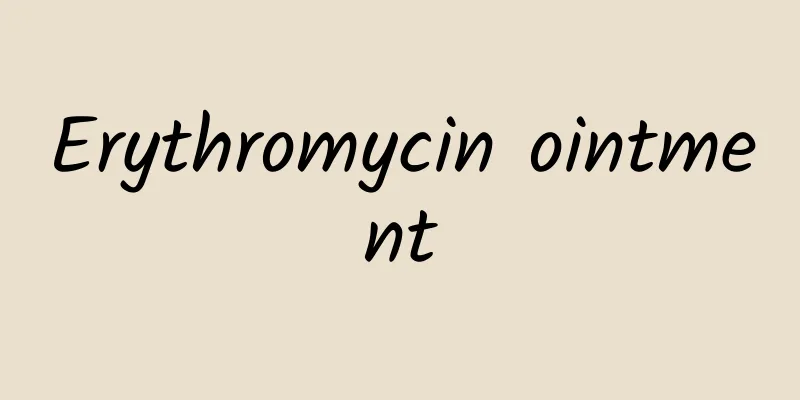Erythromycin ointment

|
Everyone should have used erythromycin ointment in their daily lives. It has many functions, especially for some skin diseases. If your skin has suppuration, burns, or acne, you can use this ointment, and the effect is very good, and the irritation is also very small. Many people also use erythromycin ointment to remove acne. This kind of acne ointment has also been liked by many people. If your skin is slightly burned or scratched in life, you can apply some erythromycin ointment. Also, now that summer is here, mosquito bites are inevitable, and erythromycin ointment can come in handy at this time. It can disinfect and relieve itching very well. Erythromycin ointment's effect on minor trauma: Erythromycin ointment can be used for minor bruises, scratches or other traumas on the body. The general usage is to clean and disinfect the affected area, then apply an appropriate amount of ointment to the affected area, twice a day. The effect of erythromycin ointment on mild burns and scalds: For small burns and scalds, you can first rinse the wound with cold water, and then apply a thin layer of erythromycin ointment on the surface. The effect of erythromycin ointment on mosquito bites: When the mosquito bite is serious, the bitten area should be cleaned and disinfected in time, and an appropriate amount of this ointment should be applied twice a day for 5-7 consecutive days. Angular cheilitis caused by erythromycin ointment: Angular cheilitis is mostly caused by infection and is more common in preschool children. For bacterial angular cheilitis, you can apply a small amount of erythromycin ointment and take vitamin B2 at the same time. The effect of erythromycin ointment on nosebleeds: dry weather can make the originally dry nasal mucosa of some people more fragile, so nosebleeds often occur. At this time, you may wish to apply an appropriate amount of erythromycin ointment to the nasal septum, 4-5 times a day. It can disinfect and soften the nasal cavity, moisturize the nasal mucosa, improve the nasal environment, and prevent re-bleeding. Do not apply too much to prevent the ointment from flowing back into the mouth. The effect of erythromycin ointment on skin infection: As an antibiotic ointment, erythromycin ointment is first used to treat and prevent skin infections. Erythromycin ointment can be used for purulent skin diseases such as impetigo and infections of ulcer surfaces. It can also be used for infections at the junction of the skin and mucous membranes, such as around the mouth and anus. The general usage is 2 times a day, apply thinly to the affected area. In addition to fighting infection, erythromycin ointment has other uses. Can erythromycin ointment and erythromycin eye ointment both be used to treat acne? There is also a dosage form of erythromycin ointment for eye inflammation, called erythromycin eye ointment. They contain different concentrations of erythromycin, with the ointment containing 1% and the eye ointment containing 0.5%. In summary, erythromycin ointment is not a special acne-removing medicine. The reason why erythromycin has the effect of removing acne is probably because it has anti-inflammatory effects and has anti-inflammatory effects on purulent acne. In addition, studies have found that although erythromycin ointment is widely used, it is ineffective for skin diseases caused by fungal infections, such as tinea capitis, onychomycosis, tinea cruris, and tinea manuum and pedis. Erythromycin ointment may occasionally cause adverse reactions, such as local burning, dryness, itching, erythema, and occasionally urticaria-like reactions. If the above adverse reactions occur, stop using the product immediately. Erythromycin ointment can be used by almost everyone, and it is very effective in treating some skin diseases. Generally, we use this ointment after the skin is scratched, burned, or bitten by mosquitoes. Apply a little to the affected area. It can also prevent skin infection and can suppurate well. If some adverse reactions occur during use, it should be stopped in time. |
>>: What is Orange Cough Syrup?
Recommend
The efficacy and function of Stephania tetrandra
Qianjin vine is a very nutritious and precious me...
Share this! What to do when encountering freezing rain? Here are 5 tips for a safe trip!
In addition to the sudden drop in temperature, th...
How do huge surface ships evade sensitive radar?
With the development of modern detection equipmen...
The efficacy and function of stone vegetable
There are many types of Chinese medicine. When we...
As we advance deeper into space, what should we do if we encounter a fire?
Author: Qian Hang, aerospace science expert at th...
Do you have the same stutter as Shen Gongbao? The doctor teaches you how to speak smoothly from "stuttering"
The domestic animated film "Nezha: The Devil...
Lighthouse inheritance | Wu Mengchao: A doctor with a heart of compassion and a heart of bravery
He performed the first liver cancer middle lobect...
The efficacy and function of red fennel root
Fennel root is a common Chinese medicine. It can ...
Imitation of wild Dendrobium officinale efficacy
In fact, it is divided into many types. The stem ...
Big news! The ability to clone someone is no longer a problem? The immersive "clone technique" that allows you to experience the world from 300 kilometers away
Even if they are 300 kilometers away, humans can ...
What are the medicinal values of white wolfberry?
Wolfberry is a very common food ingredient in dai...
How effective are noise-canceling headphones? Are they truly noise-canceling or just a waste of money?
The rapid development of science and technology h...
The efficacy, effects and contraindications of chrysanthemum
Chrysanthemum is not only a plant with extremely ...
The efficacy and function of Datura leaves
Datura leaf is a familiar medicinal material with...
Suddenly your temper becomes bad and you suffer from insomnia? I suggest you check this part immediately
If you suddenly find yourself The weight that has...









